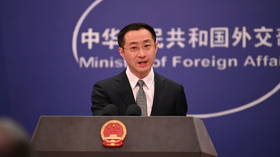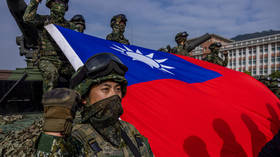Beijing sanctions US defense firms over Taiwan

Beijing has imposed sanctions on more than a dozen US military firms and senior executives in response to the latest approval of arms sales by Washington to Taiwan, the Chinese Foreign Ministry announced on Thursday.
Last week, the US State Department authorized an additional $385 million in military sales to Taiwan, following a package of up to $2 billion approved in October, announced a month after a $567 million deal which was signed off in September.
The latest agreement “seriously violates” the One-China principle, “severely interferes in China's internal affairs, and seriously undermines” the country’s sovereignty and territorial integrity, Foreign Ministry spokesperson Lin Jian said at a press conference.
While the US officially adheres to a One-China policy, recognizing Taiwan as part of China, it simultaneously engages in military cooperation with the government in Taipei.
In response to the latest arms deal, the assets of 13 US defense companies in China will be frozen from Thursday on, and the firms will be prohibited from engaging in trade and cooperation with Chinese entities and individuals, the Foreign Ministry said. The same measures will apply to the six listed senior executives, who will also be denied visas or entry to China.
The ministry urged the US to “immediately stop arming Taiwan and stop condoning and supporting” the island’s “independence” forces.
Self-rule was established in Taiwan by nationalist forces after their defeat in the Chinese Civil War in 1949. Only a handful of nations currently recognize the island’s sovereignty, with most of the world, including Russia, complying with Beijing’s request that it be seen as part of the People’s Republic.
China held large-scale military drills around the island in October. The government in Taipei has claimed that Beijing will never “renounce the use of force” against it.
China’s Foreign Ministry previously highlighted that the ongoing US support to Taiwan contradicts earlier commitments under the August 17 Communiqué from 1982, in which Washington pledged not to pursue a long-term policy of arms sales to Taiwan and expressed its intention to gradually reduce arms sales over time.
In November, Chinese President Xi Jinping identified the Taiwan issue as among the key boundaries that the US must respect in order to maintain a balanced relationship between the two countries.













